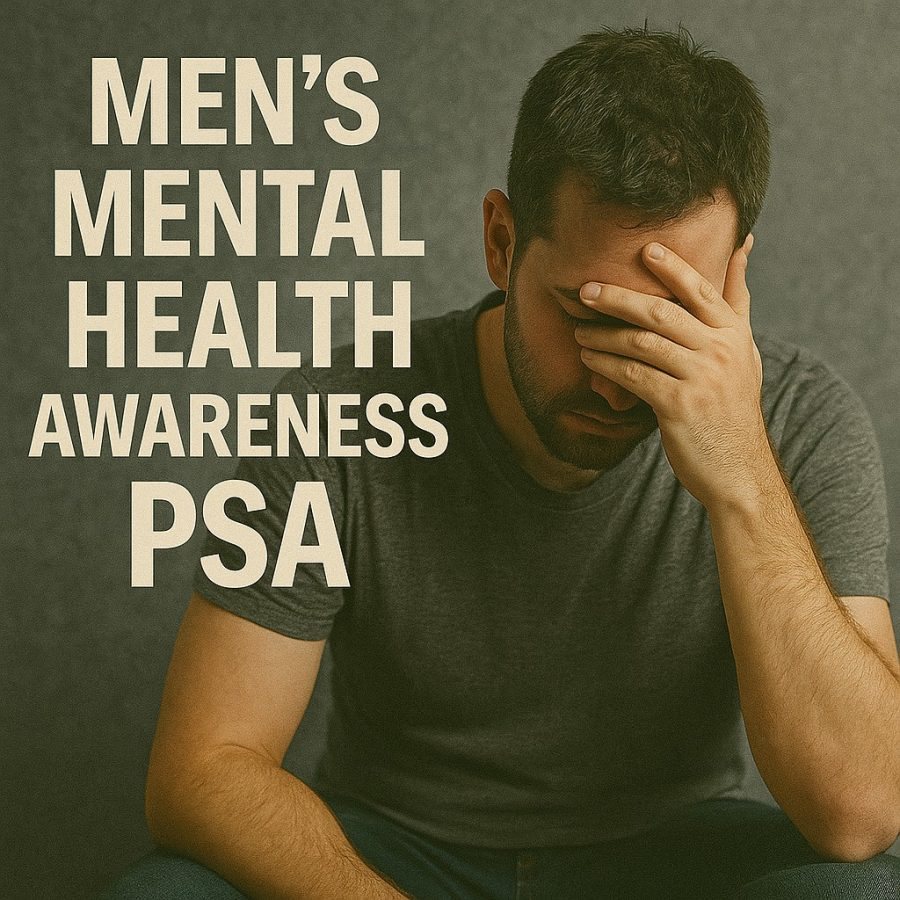Views: 0
When people talk about health, they often focus on physical strength, diet, or fitness. What rarely gets the same attention is the mind. Men, in particular, are told to be tough, to “man up,” and to carry burdens without complaint.
This silence has built a cultural wall where many men struggle alone. That is why a Men’s Mental Health Awareness PSA is not just a public service message. It is a call to action that can change lives.
This article highlights the importance of men’s mental health, explores the barriers men face, and shares practical ways to break the stigma. It also provides strategies for men, their families, and communities to support a healthier future.
Why a Men’s Mental Health Awareness PSA Matters
Men are less likely than women to seek mental health support, yet suicide rates among men are consistently higher worldwide. A Men’s Mental Health Awareness PSA serves as a spotlight, reminding society that invisible battles are as real as physical ones.
A strong message can normalize conversations about therapy, stress, depression, and anxiety. Just like an ad campaign about heart disease raises awareness, a focused PSA about men’s mental health can encourage men to speak up, seek help, and know they are not alone.
The Stigma Surrounding Men’s Mental Health
For generations, men have been taught that vulnerability equals weakness. This mindset discourages open dialogue and can lead to untreated conditions.
A Men’s Mental Health Awareness PSA works to dismantle this outdated belief.
When men believe they must always be providers and protectors, they often neglect their own needs. This suppression can evolve into anger, isolation, or harmful coping mechanisms.
By changing the narrative, awareness campaigns open the door to healthier forms of expression.
Common Struggles Men Face
A Men’s Mental Health Awareness PSA highlights issues that many men encounter but hesitate to discuss:
- Workplace pressure: High expectations tied to career success often create chronic stress.
- Relationship strain: Difficulty communicating emotions can strain partnerships and friendships.
- Financial stress: Debt and economic responsibility weigh heavily on mental well-being.
- Identity crises: Struggles with masculinity, fatherhood, or aging can shake self-image.
- Substance reliance: Alcohol or drugs may become coping tools for unresolved pain.
By naming these struggles in a PSA, men see that their challenges are valid and shared by many.
The Role of Culture and Society
Different cultures hold unique views of masculinity. In many communities, men are taught that silence is honorable. A Men’s Mental Health Awareness PSA challenges these cultural codes by encouraging openness.
When communities place value on emotional resilience alongside physical resilience, men can thrive. Instead of viewing therapy as weakness, society can promote it as strength. Awareness campaigns are essential to this cultural shift.
The Power of Storytelling in a PSA
Nothing captures attention like real stories. A Men’s Mental Health Awareness PSA that includes testimonials, interviews, or personal accounts becomes relatable.
When men hear others share struggles with depression or anxiety, they recognize parts of their own journey.
Storytelling also humanizes statistics. A chart showing suicide rates is powerful, but a story about a father, son, or veteran who reached out for help resonates on a deeper level.
Statistics That Demand Attention
Data strengthens a Men’s Mental Health Awareness PSA by showing the scale of the issue. According to recent studies:
- Men are nearly four times more likely than women to die by suicide.
- Over 70 percent of people who die by suicide are male.
- Men are less likely to access mental health services compared to women.
Numbers like these cannot be ignored. A PSA built on both empathy and data is more likely to inspire action.
Practical Solutions for Men
Awareness is only the beginning. A Men’s Mental Health Awareness PSA should also share solutions men can use immediately:
- Therapy and counseling: Professional support helps men process emotions safely.
- Peer support groups: Meeting with others facing similar challenges fosters connection.
- Healthy outlets: Exercise, hobbies, or journaling replace destructive coping methods.
- Communication skills: Learning to express feelings reduces strain in relationships.
- Routine check-ins: Friends and family can normalize asking “How are you really?”
When men see concrete steps, they feel empowered rather than overwhelmed.
How Families Can Support Men
Behind every man is a network of relationships that influence his well-being. A Men’s Mental Health Awareness PSA should remind families to:
- Create safe spaces where men can talk openly.
- Listen without judgment or rushing to solve problems.
- Encourage professional help when signs of struggle appear.
- Model openness by discussing their own challenges.
Family involvement breaks isolation and provides accountability that men often need.
Workplace Responsibility
Workplaces can either add pressure or offer relief. A Men’s Mental Health Awareness PSA aimed at employers highlights the role companies play in supporting staff.
Offering mental health days, providing counseling services, and fostering non-toxic environments are steps that can transform workplace culture.
A healthy worker is not just more productive. He is also more present at home, more engaged in relationships, and more likely to live longer.
Employers who prioritize mental health contribute to stronger communities overall.
The Role of Schools and Universities
Younger men face unique challenges with identity and social pressures. A Men’s Mental Health Awareness PSA can target schools and universities to implement early education.
Teaching boys emotional intelligence, coping skills, and the importance of seeking help prevents long-term struggles.
The earlier awareness begins, the greater the chance of raising men who view mental health as a priority, not an afterthought.
Veterans and Men in High-Stress Roles
One group often highlighted in Men’s Mental Health Awareness PSAs is veterans.
Returning from military service brings unique challenges like PTSD. The difficulty adjusting to civilian life.
First responders face similar pressures.
Awareness campaigns tailored to these groups ensure that their sacrifices are honored not only with medals, but with accessible support for their minds.
Media and Representation
Film, television, and sports greatly influence how men view themselves.
A Men’s Mental Health Awareness PSA can use these platforms to challenge harmful stereotypes.
When athletes, actors, or musicians openly discuss therapy or struggles, it normalizes vulnerability.
Positive representation shows that strength and emotional honesty are not opposites. They are partners.
How Technology Can Help
Digital tools make support more accessible. A Men’s Mental Health Awareness PSA can guide men toward online therapy, meditation apps, or anonymous hotlines.
Technology bridges the gap for those who hesitate to walk into a clinic.
With one click, men can connect to resources that might save their lives.
Community Action and Events
Awareness spreads fastest when communities engage together. A Men’s Mental Health Awareness PSA can promote walks, fundraisers, and workshops.
These events give men and families the chance to show visible support.
Small efforts like local meetups or social media campaigns can ripple outward, making the issue impossible to ignore.
Language Matters
The words used in a Men’s Mental Health Awareness PSA must be chosen carefully. Language should invite men in, not push them away.
Instead of framing help-seeking as weakness, campaigns can describe it as building strength, resilience, and courage.
Positive framing changes how men interpret the message and increases the likelihood of action.
Taking the First Step
Many men avoid seeking help because the first step feels impossible. A Men’s Mental Health Awareness PSA should emphasize that reaching out is not a giant leap, but a small, manageable step.
Calling a hotline, talking to a friend, or scheduling a first counseling session all count as victories.
Every journey begins with that first step.
The Future of Men’s Mental Health Awareness
As society grows more aware, the potential of Men’s Mental Health Awareness PSAs increases. Campaigns will expand across digital platforms, workplaces, and schools, creating a culture where seeking support is expected, not hidden.
The future depends on consistent messaging that keeps mental health visible, relevant, and actionable for men of all ages.
A Shared Responsibility
Men’s mental health is not a private battle. It is a public responsibility. Every man is a son, friend, colleague, or father to someone.
By raising awareness through a Men’s Mental Health Awareness PSA, society takes collective responsibility for supporting them.
Healing is not just personal. It is cultural.
Closing Thoughts
A Men’s Mental Health Awareness PSA is more than an announcement. It is a lifeline. It reminds men that asking for help is not weakness.
It is the most courageous act they can take. By breaking the silence, providing resources, and encouraging open dialogue, society can transform the way men view themselves and their mental well-being.
If even one man sees such a message and decides to speak instead of suffer in silence, then the mission is successful. That is the true power of awareness.






